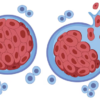A Comprehensive Guide to Managing Nasal Polyps with Ayurveda
A Comprehensive Guide to Managing Nasal Polyps with Ayurveda are soft, noncancerous growths that develop in the nasal passages or sinuses, causing symptoms such as congestion, reduced sense of smell, and frequent infections. Conventional treatments often involve medications or surgical procedures, but Ayurveda, the ancient Indian system of medicine, offers a holistic approach to managing nasal polyps. This blog explores Ayurvedic principles, remedies, and lifestyle changes that can help alleviate the symptoms and underlying causes of nasal polyps.
Understanding Nasal Polyps in Ayurveda

In Ayurveda, health is seen as a balance between the three doshas: Vata, Pitta, and Kapha. These doshas represent different elements and bodily functions:
- Vata: Governs movement and is associated with air and space.
- Pitta: Governs transformation and is associated with fire and water.
- Kapha: Governs structure and lubrication and is associated with earth and water.
Nasal polyps are often linked to an imbalance in the Kapha dosha. Kapha governs the production of mucus and overall moisture in the body. When Kapha becomes excessive or imbalanced, it can lead to the accumulation of mucus, which may cause inflammation and lead to the formation of nasal polyps.
Ayurveda views nasal polyps as a result of chronic Kapha aggravation, which could be due to poor diet, lifestyle, or environmental factors. Thus, Ayurvedic treatment focuses on reducing excess Kapha, addressing inflammation, and restoring balance.
Ayurvedic Remedies for Nasal Polyps
Ayurveda employs a variety of natural remedies to manage nasal polyps, targeting both the symptoms and underlying causes. These include herbal treatments, dietary modifications, and lifestyle changes.
1. Herbal Treatments
- Turmeric (Curcuma longa): Known for its powerful anti-inflammatory properties, turmeric contains curcumin, which helps reduce inflammation and supports overall immune health. Incorporate turmeric into your diet by adding it to curries, soups, or smoothies. Turmeric tea, made by boiling turmeric powder in water, can also be soothing.
- Ginger (Zingiber officinale): Ginger has both anti-inflammatory and mucolytic properties, helping to reduce mucus production and ease nasal congestion. Fresh ginger tea or ginger added to meals can provide relief.
- Tulsi (Holy Basil): Tulsi is highly valued in Ayurveda for its ability to balance Kapha and support respiratory health. Tulsi tea can help reduce inflammation and clear nasal passages.
- Peppermint (Mentha piperita): Peppermint contains menthol, which acts as a decongestant and helps to relieve nasal congestion. Drinking peppermint tea or inhaling peppermint steam can provide symptomatic relief.
- Triphala: This traditional Ayurvedic formula, composed of three fruits—Amalaki (Indian gooseberry), Bibhitaki, and Haritaki—helps balance the doshas and support detoxification. Triphala is often used to reduce inflammation and improve overall nasal health.
2. Nasal Irrigation
- Neti Pot: Nasal irrigation using a neti pot with a saline solution is a common Ayurvedic practice. It helps flush out mucus, allergens, and other irritants from the nasal passages, providing relief from congestion and inflammation. Use a saline solution prepared with warm water and non-iodized salt.
- Nasal Drops: Ayurvedic nasal drops, such as those containing Anu Taila, can help lubricate and soothe the nasal passages. These drops can also help reduce inflammation and prevent infections.
3. Dietary Recommendations
- Anti-Inflammatory Foods: Incorporate foods with anti-inflammatory properties into your diet, such as leafy greens, berries, nuts, and seeds. These foods help reduce overall inflammation and support immune function.
- Warm Foods and Spices: Eating warm, cooked foods with spices like black pepper, cumin, and turmeric can help balance Kapha and reduce mucus production. Avoid cold, heavy foods that can aggravate Kapha imbalances.
- Hydration: Staying well-hydrated helps thin mucus and promotes better nasal drainage. Drink plenty of water throughout the day, and consider herbal teas that support respiratory health.
4. Lifestyle Adjustments
- Regular Exercise: Engaging in regular physical activity helps balance the doshas and improves overall respiratory health. Exercise also helps reduce stress, which can contribute to inflammation and polyps.
- Stress Management: Practices such as meditation, yoga, and deep breathing exercises can help manage stress and balance the doshas. Reducing stress can have a positive impact on inflammation and overall health.
- Adequate Sleep: Ensure you get sufficient rest to support your body’s natural healing processes. Quality sleep helps maintain immune function and reduce inflammation.
5. Avoiding Triggers
- Allergens: Identify and avoid allergens that may contribute to nasal polyps, such as dust, pollen, pet dander, and certain foods. Using air purifiers and keeping your living space clean can also help reduce exposure.
- Environmental Irritants: Minimize exposure to environmental pollutants, smoke, and strong odors, which can aggravate nasal inflammation.
Integrating Ayurveda into Your Routine
To effectively manage nasal polyps with Ayurveda, consider incorporating these practices into your daily life:
- Consultation with an Ayurvedic Practitioner: Work with a qualified Ayurvedic practitioner to assess your dosha balance and develop a personalized treatment plan. They can provide specific recommendations for herbs, dietary changes, and lifestyle adjustments based on your unique needs.
- Consistency: Ayurveda emphasizes the importance of consistent practice in achieving and maintaining balance. Implement the recommended remedies and lifestyle changes regularly to see the best results.
- Regular Follow-Ups: Schedule regular follow-ups with your Ayurvedic practitioner to monitor your progress and make any necessary adjustments to your treatment plan.
Conclusion
Managing nasal polyps with Ayurveda involves a holistic approach that addresses the root causes of the condition, rather than just treating the symptoms. By focusing on balancing the doshas, reducing inflammation, and supporting overall nasal health through herbal remedies, dietary modifications, and lifestyle changes, you can complement conventional treatments and improve your quality of life.
Ayurveda offers a wealth of natural remedies and practices that can help alleviate the discomfort associated with nasal polyps and support long-term wellness. Remember to consult with a qualified Ayurvedic practitioner to tailor the approach to your specific needs and ensure a comprehensive, individualized treatment plan.
By integrating Ayurvedic principles into your daily routine, you can achieve a balanced, healthier state and potentially find relief from the symptoms of nasal polyps, enhancing your overall well-being.








Leave a reply